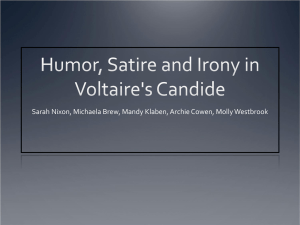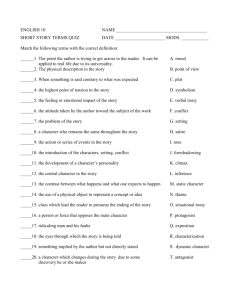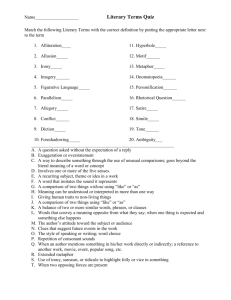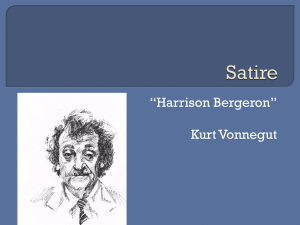Common Rhetorical Strategies/Stylistic Device
advertisement
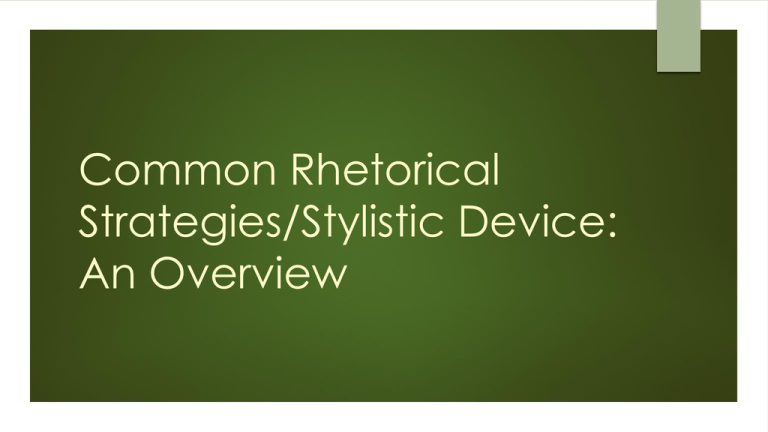
Common Rhetorical Strategies/Stylistic Device: An Overview Figurative Language and Rhetorical Strategies Figurative language is strictly defined as speech or writing that departs from literal meaning to achieve a special effect or meaning. The terms covered later in this section are terms you should know before taking the exam. Multiple-choice questions may use them in answer choices, and you are certainly expected to use them in your free-response essays. Imagery For the purpose of this exam, you may consider imagery to be synonyms with figurative language. However, in a more restricted sense, imagery is figurative language that is used to convey a sensory perception (visual [seeing], auditory [hearing], olfactory [smelling], tactical [feeling/touching], or gustatory [tasting]). Hyperbole Hyperbole is overstatement or exaggeration; it is the use of figurative language that significantly exaggerates the facts for effect. In many instances, but certainly not all, hyperbole is employed for comic effect. Example: If you use too much figurative language in your free response essays, the AP readers will crucify you! Clearly, this statement is a gross exaggeration; while the readers may give you a poor grade if you use figurative language that doesn’t suit the purpose of your essay, they will not kill you.’ Understatement Is figurative language that presents the facts in a way that makes them appear much less significant than they really are. Understatement is almost always used for comic effect. Example: After dinner, they came and took into custody Doctor Pangloss and his pupil Candide, the one for speaking his mind and the other for appearing to approve what he heard. They were conducted to separate apartments, which were extremely cool and where they were never bothered by the sun. Taking the last sentence literally would lead you astray. The understanding in this case (“they were conducted to separate apartments, which were extremely cool and where they were never bothered by the sun”) should be taken to man that the poor men were thrown into horribly dark, dank, and cold prison cells. Simile and Metaphor Simile Metaphor A simile is a comparison between two unlike objects, in which the two parts are connected with a term such as like or as. A metaphor is a simile without a connecting term such as like or as. Here’s an example of a metaphor. Example: The birds are like black arrows flying across the sky. Example: The birds are black arrows flying across the sky. You can easily identify a simile- and distinguish it from a metaphor- because of the use of like or as. Birds are not arrows, but the commonalities (both are long and seek, and they travel swiftly through the air- and both have feathers) allow us to easily grasp the image. Extended metaphor An extended metaphor is precisely what it sounds like- it is a metaphor that lasts for longer than just one phrase or sentence. A word of caution for the exam, however; do not use extended metaphors in your own AP essays, for many scholars (and many AP graders) believe that the extended metaphor is a poor expository or argumentative technique. Example: During the time I have voyaged on this ship, I have avoided the cabin; rather, I have remained on deck, battered by wind and rain, but able to see moonlight on the water. I do not wish to go below decks now. As surprising as this may seem, this passage is not about nautical navigation. The ship’s voyage is the central metaphor (representing the course of life); the writer extends the metaphor by relating elements of figurative language: cabin, deck, wind and rain, moonlight, water and decks. The cabin is a safe place, but it’s a place where you can’t experience much; on deck, you’re exposed to the elements, but you can experience beauteous sights. Having made the difficult, dangerous, but rewarding choice of staying on deck, it would be a personal defat, a kind of surrender to wish for the safety, comfort, and limited horizons of the cabin later in life. Symbol A symbol is a word that represents something other than itself. Example: The Christians soldiers did not stop to think about the actual animal; the lamb is a traditional Christian symbol for Jesus Christ. In this case, the rough, tough soldiers did not stop to think about the actual animal; the lamb is a traditional Christian symbol for Jesus Christ. Sometimes, it is difficult to distinguish between metaphor and symbol. Remember that a metaphor always contains an implied comparison between two elements. Recall the metaphorical image of the birds and the arrows: the birds remain birds, and the arrows remain arrows- the metaphor serves to give us an image of the flight of the birds by suggesting a visualization of arrows. However, in the case of a symbol, the named object really doesn’t count. There is no lamb; lamb is merely an object that’s meant to conjure up another object or element. Denotation and Connotation Denotation refers to a word’s primary or literal significance, while connotation refers to the sometimes vast range of other meanings that a word suggests. Context determines which connotations may be appropriate for a word. Some literary critics argue that it is impossible to distinguish between denotation and connotation. Who, they ask, is to determine which meaning to assign as a primary significance? Let’s move on and look at an example. Example: I am looking at the sky. The denotation of the underlined word should be as clear as a cloudless associated with the word. The sky is often associated with heaven; it can also evoke the idea of freedom or vast openness. Because of connotation, one can’t help but believe that the sky evokes in the writer a sense of longings for freedom from work, the computer, or the AP English language and Composition exam. Oxymoron An oxymoron is an apparent contradiction of terms. Example: I advise you to make haste slowly. Why would you do if someone said this to you? At first, you might think that this is simply a foolish, contradiction statement, and you might ignore the advice. However, it is possible to make sense of the apparent contradiction, which is in fact an oxymoron. In essence, the sentence advises you to go as fast as you can, while going slowly enough to do things right. Paradox The paradox is an apparent contradiction of ideas or statements and, therefore, is closely related to the oxymoron. Think of a paradox as an oxymoron on a larger scale. Example: The only way to overcome death is to die. This paradox pops up in Various contexts; it is not a contradiction, for some would say that only after death is it possible to pass on to eternal life( in heaven, for instance), and eternal life precludes (another) death. Thus, one dies ( physically) but then lives (spiritually) Forever. It is possible to have a paradox that offers no real hope of resolution. For instance, there is the Cretan Liar Paradox (dating from Greek times), which goes like this “ all Cretans are liars; I am a Cretan.” Personification Personification is the figurative device in which inanimate objects are given human qualities. It can enhance our emotional response because we usually attribute more emotional significance to other humans than to things or concept. Example: He had been wrestling with lethargy for days, and every time that he thought that he was close to victory, his adversary escaped his hold. This figurative wrestling match, in which lethargy is personified as the opponent to the author of this sentence, brings the struggle to life- human life. If you don’t believe me, think about the literal alternative: He tried to stop being lethargic, but he was not successful. This doesn’t sound very lively. Rhetorical Questions A rhetorical question is a question whose answer is obvious; these types of questions do not need to be answered-and usually aren’t. Rhetorical questions attempt to prove something without actually presenting an argument; sometimes they’re used as a form of irony, in which something is stated, but its opposite is meant. Example (no irony): With all the violence on TV today, is it any wonder kids bring guns to school? Since I’ve already determined that you agree( even if you don’t), then I don’t have to substantiate my remark-especially if I keep speaking (or writing) and don’t let you get in a word edgewise. Example (with irony): Aren’t AP exams great fun? Here, there is an assumption that you would answer in the negative, although there is no way for you to respond- unless you write us a letter. Rhetorical questions allow a writer to make a point without further support whether it’s a straightforward remark or one with a touch of irony. Bombast Bombast (adjective= bombastic) is language that is overly rhetorical (pompous), especially when considered in context. Generally speaking, graduation speeches contain bombast; pedantic people (those who use their learning ostentiously) tend to use bombast. Occasionally, a passage on the AP English Language and Composition exam will contain bombast. We are here in these hallowed halls, accompanied By genial kin and erudite mentors, surrounded by Corinthian columns and the three wisdom of the ages, To celebrate the conjunction of fare the well and many Happy returns and to proffer advice worthy of Athena To these prodigal sons and daughters as they depart our august institution. You happy survivors are not graduates, But champions who have been assailed on all sides By demons of mathematics, dragons of science, and inhuman beasts of humanities, but who have emerged victorious from each and every battle. In this respect, one is reminded of Thucydides, who writers:” so long as a vessel was coming up to charge another boat, the men on the decks rained darts, arrows and stones upon her, but once alongside, the heavy infantry tried to board each other’s vessel, fighting hand to hand. In many quarters it happened, because of the restricted space, that a vessel was charging an enemy on one side and being charged herself on another, and that two or even more ships were entangled all around one, obliging the helmsmen to attend to defense here, offense there, not to one thing at a time, but to many things on all sides, while the huge commotion caused by the number of ships crashing together not only spread terror, but also made the orders of the boatswains inaudible. I urge you to remember Attica, and to remember the Spartan way, for … The passage above is marked by pretentious and inflated speech; it is a perfect example of bombast. I certainly hope that your commencement speaker does not concoct a bombastic speech such as this one! Pun A pun is a play on words. In general, a pun either plays on the multiple meanings of a word or replaces one word with another that is similar in sound but very different in meanings. Puns are almost always used for comic effect. Example: In Star Wars, why did the Evil Empire leave the Catholic nuns alone? Force of habit. If you know anything about Star Wars, you know that the “force” is the power of good, and you’ll get the play on words here. Metonymy and Synecdoche Both metonymy and synecdoche are terms that mean the use of figurative language in which characteristics are substituted for the things with which they are associated. In metonymy, one term is substituted for another term with which it is closely associated. Synecdoche is a form of metonymy that’s restricted to case where a part is used to signify the whole. The hands (part of each sailor) represent the sailors (the whole). Example: The sailors drank a glass of hearty red. If you have an aversion for learning rhetorical terms, then for the purpose of this exam you can feel free to forget the definition of synecdoche; you can get away with using the term metonymy for any situation in which a characteristic of a certain thing is used to represent the thing. Red is a color; sailors cannot drink it. However, metonymically, the color represents wine (red wine), which sailors over the age of twenty-one may drink. Theme A theme is a general idea contained in a text; the theme may be stated explicitly or only suggested. A theme is not just an idea; it is an idea that is developed, often over the course of a chapter or an entire book. Usually, one can identify a central theme and several minor ones. Sometimes both are overtly starved, as in the example that follows: Many scholars agree that the central theme in Huckleberry Finn is the conflict between nature and civilization. But clearly, the book contains other themes, such as the worth of honor and the voyage of self-discovery. Read the following passage, and see if you can identify a central theme. We now touch on civilization’s most sensitive spot; it is An unpleasant task to raise one’s voice against the folly of The day, against chimeras that have caused a downright epidemic. To speak against the absurdities of trade today means To expose oneself to anathemas, just as much as if one Had spoken against the tyranny of the popes and the Barons in the twelfth century. If it were a matter of choosing Between two dangerous roles, I think it would be less dangerous to offend a sovereign with bitter truths Than to offend the mercantile spirit that now rules like a Despot over civilization-and even over sovereigns! And yet a superficial analysis will prove that our commercial systems defile and disorganize civilization and that in trade, as in all other things, we are being led Further and further astray. The controversy on trade is barely half a century old And has already produced thousands of books, and yet The participants in the controversy have not seen that the trade mechanism is organized in such a way that it is a Slap in the face to all common sense. It has subordinated The whole of society to one class of parasitic and unproductive Persons: the merchants. All the essentials classes Of society-the proprietor, the farmer, the manufacturer, and even the government-find themselves dominated By a non-essential, contingent class, the merchant, who Should be their subordinate, their employed agent, removable And accountable, and who, nevertheless, directs And obstructs at will all the avenues of circulation. It should not surprise you that the title of the essay that this passage is excerpted from is “ On Trade”. In his essay, the French socialist Charles Fourier develops a central theme: Merchants, through trade, have both corrupted society and become its tyrant. Many of the passages in the AP English Language and Composition Multiple- Choice and Free-Response sections of the AP exam are long enough to permit you to identify at least one central theme, and you will almost certainly be asked to do so. Aphorism An aphorism is a concise, pithy statement of an opinion or a general truth. Example: Life is short, the art [of medicine] is long, opportunity fleeting, experimentation dangerous, reasoning difficult. That aphorism is attribute to Hippocrates, the “Father of Medicine.” Note that his statement is more sophisticated than the “commonplace wisdom” of a saying like “Haste makes Waste.” Malapropism Malapropism is the unintentional use of a word that resembles the word intended but that has a very different meaning. Example: The girl used a fire distinguisher to put out the blaze. The AP English Language and Composition readers often collect malapropisms to share with friends and colleagues as they read through the free-response essays; it isn’t in your best interest to provide them with any good laughs, so try to avoid them. Circumlocution and Euphemism Circumlocution has two meanings, and you should be familiar with both of them. For the purposes of this exam, we’ll say that one meaning of circumlocution is “talking around a subject” and that the other is “talking around a word.” Now let’s take a closer look at some examples of circumlocution. It is entirely possible that you have used circumlocution when ADDRESSING YOUR PARENTS. For instance, instead of simply asking them straight out if you may borrow the car, have you ever said something such as “I understand that you guys are going to stay in tonight and watch a DVD, right? If so, since I’ve already seen that movie, I was thinking about maybe going downtown. It’s a nice summer evening and all that, but it’s still too far to walk, and I’ll be with Nina, anyway, and she’d never agree to walk downtown. We were thinking that she could drive, but, unfortunately, Nina’s parents are going out, so she can’t take their car. I know that I forgot to put gas in your car the last time that I drove to the mountains, but I learned my lesson. That won’t happen again.” You may even have gone on speaking for longer. You might never have gotten to the point where you actually asked to borrow the car, but your parents understood what you wanted and put you out of your misery by saying something such as “WE already told your sisters that she could use the car tonight.” That kind of circumlocution is an example of the first meaning of circumlocution - “talking around the subject.” On the AP English Language and Composition exam, you’re more likely to encounter the second type of circumlocution-“talking around a word”- that is, using several words or a phrase in place of a specific word (or specific words). You may have noticed that sometimes it is more effective to be wordy than to be precise. For example, some people consider their automobiles cars, and, not surprisingly, they refer to these objects as cars. Other people however use evocative circumlocutions when referring to their heap of metal- one of which is “cruising’ machine” (and the other of which is “heap of metal.”) The point is that circumlocution is often an effective means for communicating points of view. Take a look at the following sentence: Candied was court-martialed, and he was asked which He liked better, to run the gauntlet six and thirty times Through the whole regiment, or to have brains blown Out with a dozen musket-balls. In this sentence, we read that in a spirit of compassion and justice, the military court is giving Candied a choice: He may choose to be either beaten to death or executed by firing squad. The wording of the second choice, in particular, provides a wonderful example of the evocative power of well-used circumlocution. While using the phrase “execution by firing squad” would have allowed both the author and the reader to remain distant from the event and dispassionate, the circumlocution that the author employed with “to have his brains blown out with a dozen musket-balls” vividly describes the horror and brutality of the event. In this sentence, Voltaire succeeds in relating his feelings about the court-martial without commenting on it. Euphemism A euphemism is a word or words that are used to avoid employing an unpleasant or offensive term. Again, you probably (hopefully) use euphemisms all the time. In both fiction and nonfiction, the most common euphemisms have to do with sex. In these cases, the author knows what he or she means, you know what he or she means, and the author knows that you know what he or she means. Let’s look at another example from Voltaire’s Candied. In this passage, Voltaire uses euphemism for comic effect. . One day when Mademoiselle Cunegunde went to Take a walk in a little neighboring wood that was called A park, she saw-through the bushes-the sage Doctor Panglos giving a lecture in Experimental philosophy to Her mother’s chambermaid, a little brown wench, very Pretty and very accommodating. Voltaire knows that his readers know what is really going on here. This particular example of euphemism is used for comic effect rather that direct avoidance of the word sex. One may expect Pangloss to limit his sagacity to philosophical matters, but clearly his “lecture in experimental philosophy” is most prosaic. Irony and Satire When reading the passages on the AP English Language exam, you cannot always take what you see at face value; in fact, when reading you must always be on the lookout for slightly or very veiled meanings behind the words. Isn’t It Ironic? Irony: Most people use the term without really knowing its definition. If you don’t believe this, ask one of your friends to define irony and see what kind of answer you receive. The two basic types of irony that you’ll need to be familiar with for this test are verbal irony and situational irony. Verbal Irony Verbal irony refers to the process of stating something but meanings the opposite of what is stated. Verbal irony can refer to irony that’s used in spoken language as well as in print. In spoken language, intonation is often a clue to ironic intent; however, in writing, it is possible to imply things through intonation, so there’s always a danger that irony may be missed; in essence, the writer who employs irony risk communicating that exact opposite of what is intended. For example, let’s say that you write, “This Princeton Review book is really interesting.” Unless your listener or reader hears your remark in context, he or she won’t know if this is high praise for this book or if you’re bored silly and have chosen to express your sentiment more forcefully by using verbal irony. Consider the following passage. The philosopher Panglos has just given a rather personalized history of venereal disease, a veritable uncontrollable- and uncontrolled-plague in eighteenth-century Europe. O sage Pangloss,” cried Candide,” what a strange Genealogy is this! Is not the devil at the root of it all? Not at all, replied the great man, “it was unavoidable, A necessary ingredient in the best of worlds.” The student Candide shows sincere respect for Panglos when he addresses him as “sage Pangloss;” Candide has no ironic intent. However, the same cannot be said of the narrator-who for all intents and purpose is Voltaire. In Candide, one of Voltaire’s principal aims is to excoriate (to censure scathingly) the “philosophers of optimism’” of whom Pangloss is a caricature. He does this through the frequent use of verbal irony; in the passage above, his use of “great man” is ironic-even though Candide’s tone is not. After all. Neither the narrator nor the careful reader views Pangloss as a great man-he is just the opposite. In essence, to fully appreciate the passage, we must read in stereo, simultaneously picking up on Candide’s serious tone and the narrator’s ironic tone. This is a pretty complicated case of verbal irony. Got it? Let’s move on. Sarcasm Sarcasm is simply verbal irony used with the intent to injure. It’s often impossible to discern between irony and sarcasm, and, more often than not, sarcasm is in the mind of the beholder. Let’s say that your close friend and soccer teammate missed a wide-open goal from ten feet away, and you smiled and shouted, “Nice shot!” Presumably your friend, used to your jests, would interpret your quip as playful irony. If the opposite team’s goalie said the same words, however, it is far more likely that your friend would take the remark as sarcasm-and reply with a not-so-kind word or two. In written from, irony and sarcasm can be considered to be fairly synonymous-but just think of sarcasm as malicious. Here is an example from Heinrich Ibsen’s Helda Gabbler. Brack: There’s a possibility that the appointment may Be decided by competitionTesman: Competition! By Jove, Hedda, fancy that1 Hedda [motionless in her chair] How exciting, Tesman. Of course, it is easier to see the sarcasm when you are familiar with the play, but it is sufficient for you to know that Tesman is the rather boring, plodding husband and that Hedda is an unfulfilled wife. The stage direction(“ motionless in her chair”) helps us see that her words are at least full of irony; if you add the bitter, malignant intent, which the husband misses but we do not, then you have sarcasm. Situational Irony Situational irony refers to a situation that runs contrary to what was expected. Perhaps last year you told your friends that you didn’t care what grade you might earn on the AP English Language and Composition exam and that you wouldn’t lift a finger to prepare for the exam. But here you are, dutifully reading away, carefully studying, and feeling more confident that you’ll be successful on the test. How ironic! Here’s another example. What if you lived on the East Coast and made fun of California all the time, vociferously (Vehemently, Insistently) claiming that there was no way that you could ever live there. Then, what if you found yourself enjoying your ninth year of residence in the Sunshine State with no plans to leave? This is situational irony. Satire In satire something is portrayed in a way that’s deliberately distorted to achieve comic effect. Implicit in most satire is the author’s desire to critique what is being mocked. Voltaire’s Candide is principally a satire of optimism, the philosophy that, given that the first “cause “was perfect (Gods’s creation of the world), all causes and effects must naturally be part of this original perfect plan. The French satirist takes on many other causes, however, and one of his favorite targets is the part of religion that he considered no more than fanatical superstition. Here is what happens after Candide and Pangloss are caught in the infamous earthquake of Lisbon, Portugal. After the earthquake, which had They came and took into custody up. In these clothes they marched in destroyed three fourths of the city of Doctor Pangloss and his pupil the procession and heard a very Lisbon, the sages of that country could Candide, the one for speaking his pathetic sermon, which was followed think of no better manner to preserve mind and the other for appearing to by an the kingdom from complete ruin than approve what he heard. They were anthem accompanied by bagpipes. to entertain the people with an auto- conducted to separate apartments, Candide was flogged da-fe, it having been decided by the which were extremely cool and where to the beat of the music while the University of Coimbra that burning a they were never bothered by the sun. anthem was being sung; the few people alive over low heat and Eight days later, they were each Biscayan and the two men who would with great ceremony is an infallible dressed in a sanbenito and their not eat bacon were burned, and way to prevent earthquakes. heads were adorned with paper Pangloss was hanged, which is In consequence, they had seized a mitres. The mitre and sanbenirto worn not a common custom at these Biscayan for marrying his godmother by Candide were painted with upside solemnities. The same day there was and two Portuguese for taking out the down flames and with devils that had another earthquake, which created Bacon of a larded chicken they were neither tails nor claws, but Doctor the most dreadful havoc. eating after dinner, Pangloss’s devils had both tails and claws, and his flames were right side After the real earthquake of 1775, there were real auto-da-fes(“acts of faith”), where “evil” inhabitants of Lisbon were sacrificed to appease God, who, ostensibly( to all outward appearances), had provoked the earthquake to punish the city. The “evils” that are being punished say more about the ridiculous prejudices of the persecutors than they do about the so-called evil victims. The two Portuguese who refrained from eating the bacon ar guilty of nothing-but they are taken for Jews; the man who married his godmother, who, presumably, is not tied to him by blood, is guilty of no more than infringing on a technically of the religious code (Catholicism, in this case). Note that the satire is heightened by Voltaire’s use of verbal irony (“the sages”), situational irony (right after the ceremony there is a second earthquake), and a comical circumlocution for auto-da-fe). Satire can be effective in both fiction and nonfiction, and Candide, a philosophical story that combines both, is thought to be one of the most brilliant satires of all. Most critics, however relegate satire-and-satirists- to a secondary sphere in the universe of writing; satire makes for good entertainment, but mocking others does not measure up to the conviction of cogent writing. Had Voltaire been nothing more than a satirist he would not have been remembered as a brilliant philosophe, but as a clever joker- if he were remembered at all. Although Voltaire’s satire in Candide is quite brilliant, some other examples of satire are a little easier to figure out. Lets look at a sample question based on a purpose on a passge from Jonathan Swifts Builliver’s Travels. For about seventy moons past there have been two struggling parties in this empire, under the names of Tramecksan and Slameckson, from the high and low heels line of their shoes, by which they distinguished themselves. It is a alleged indeed, that the high heels are most agreeable to our ancient constitution
